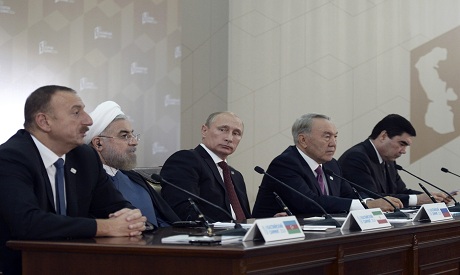
Heads of state meeting at the Caspian Summit (from left to right): President of Azerbaijan Ilham Aliyev, President of Iran Hassan Rouhani, President of Russia Vladimir Putin, President of Kazakhstan Nursultan Nazarbayev, and President of Turkmenistan Gurbanguly Berdymukhamedov (Photo: Reuters)
The leaders of the five states bordering the resource-rich Caspian Sea signed a landmark deal on its legal status on Sunday in the Kazakh city of Aktau, easing regional tensions and potentially facilitating lucrative oil and gas projects.
Azerbaijan, Iran, Kazakhstan, Russia and Turkmenistan signed the agreement on the status of the inland sea, which has been disputed since the collapse of the Soviet Union rendered obsolete agreements between Tehran and Moscow.
The host, Kazakh President Nursultan Nazarbayev said before the signing that the leaders were "participants in a historic event."
"We can admit that consensus on the status of the sea was hard to reach and not immediate, the talks lasted more than 20 years and called for a lot of joint efforts from the parties," Nazarbayev said.
Russian leader Vladimir Putin, whose country was seen as driving the deal, said the convention had "epoch-making significance" and called for more military cooperation between the countries on the Caspian.
Sunday's summit was the fifth of its kind since 2002 but there have been more than 50 lower-level meetings since the Soviet breakup spawned four new countries on the shores of the Caspian.
The deal goes some way to settling a long-lasting dispute on whether the Caspian is a sea or a lake -- which means it falls under different international laws.
While the convention refers to the Caspian as a sea, provisions in the agreement give it "a special legal status", Russian deputy foreign minister Grigory Karasin told Kommersant daily earlier this week.
The Kremlin has said the convention keeps most of the sea in shared use but divides up the seabed and underground resources.
Iran, who ended up with the smallest share of the sea under the terms of the convention, is viewed as a potential loser in the deal.
Iranian President Hassan Rouhani called the convention "a major document" Sunday but noted that it does not bring an end to all disagreements over the sea.
"Today we have a framework for actions in the Caspian Sea which was not the case before," Rouhani said in comments translated into English.
"But there are other issues to deal with in other meetings."
Nevertheless, Rouhani hailed a stipulation in the convention that prevents non-Caspian countries from deploying military forces on the sea.
"The Caspian Sea only belongs to the Caspian states," he said.
The draft agreement, briefly made public on a Russian government portal in June, refers to the Caspian as a sea but the provisions give it "a special legal status", Russian deputy foreign minister Grigory Karasin told Kommersant daily.
It is the Caspian's vast hydrocarbon reserves -- estimated at around 50 billion barrels of oil and just under 300 trillion cubic feet (8.4 trillion cubic meters) of natural gas in proved and probable reserves -- that have made a deal both vital and complex to achieve.
Any deal will "expand the field for multilateral cooperation" between the five states, said Ilham Shaban, who heads the Caspian Barrel think tank.
But some are likely to view it as more of a breakthrough than others.
Energy-rich but isolated Turkmenistan is particularly excited and President Gurganguly Berdymukahmedov has called for annual Caspian Sea Day celebrations from Sunday onwards.
Turkmenistan could benefit from a concession allowing the construction of underwater pipelines, which were previously blocked by the other states.
Nevertheless, analysts caution that Turkmenistan's long-held plan to send gas through a trans-Caspian pipeline to markets in Europe via Azerbaijan is not necessarily closer to becoming reality.
Short link: